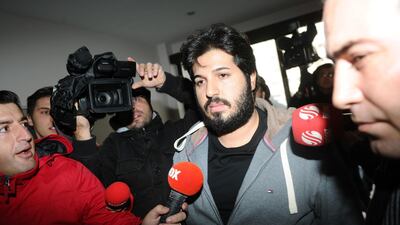The star witness in the trial of a Turkish banker accused of laundering billions of dollars of Iranian oil money has begun describing how he worked with senior officials in both countries to set up a complex scheme to avoid US sanctions.
Reza Zarrab, a Turkish-Iranian gold trader, has already admitted his role in the conspiracy and appeared in court on Wednesday during the trial of Mehmet Hakan Atilla.
In all nine people have been charged in connection with the conspiracy, including a former Turkish economy minister, but only two are currently held in the US.
Wearing tan prison scrubs, Zarrab described how the sanctions plot was hatched. He said Iran was unable to use income from oil and gas sales because of US sanctions.
“They could not use the money for international payments,” he said.
He struck a deal with the Central Bank of Iran to provide financial services after meetings in 2010 and 2011.
But when he tried to open a bank account at Aktif Bank in Turkey he was told customers dealing with Iran needed “special permission”.
He said Egemen Bagis, Turkey's former minister of EU affairs, helped him open the account.
In court documents unsealed during the trial it emerged that Zarrab, a gold trader, last month pleaded guilty to all seven counts against him, including conspiracy to violate US sanctions against Iran.
However, the plea deal also revealed that he paid corrections officers in New York "to smuggle contraband, including cell phones and alcohol into the jail for him.
Security at Manhattan’s federal courthouse was tightened on Wednesday ahead of Zarrab’s expected appearance.
The trial has already made major headlines in Turkey, where it threatens to expose high-level corruption and raise fresh questions about whether the government is using fears of a coup to cover-up wrongdoing.
The country’s deputy prime minister recently said Zarrab, who is married to Turkish pop star Ebru Gundes, was being held “hostage” by the US to testify against the Turkish government.
Earlier this year, Zarrab hired former New York City mayor Rudolph Giuliani and a former US attorney-general Michael Mukasey in a futile attempt to find a diplomatic deal to secure his freedom.
Court documents detail how he met the then governor of the Bank of Iran and the then finance minister of the National Iranian Oil Company to discuss transferring gas proceeds to a Turkish bank. The conversation included talk of bribing a bank official.
Prosecutors have promised that their case will “pull back the curtain on a crime of truly global proportions”.
In his opening statement, David Denton claimed Atilla and Zarrab transferred billions of dollars of Iranian oil money out of Turkish banks by setting up fake deals for gold and food — both exempt from US sanctions. Zarrab set up the front companies while Atilla’s understanding of international banking and sanctions helped move the money around, he said.
Their scam was protected by officials who had been bribed, he said. When it was uncovered by Turkish police, the corrupt officials organised a purge, ensuring investigators were fired or sent to prison.
“While bribes got rid of the case, they could not get rid of the evidence," added Mr Denton.
However, Atilla’s lawyer, Victor Rocco, said Zarrab had cut a deal simply to protect his lavish lifestyle.
“Atilla is another one of Reza Zarrab's many victims, a hapless, helpless pawn,” Mr Rocco said. “This trial, I submit to you, is really the Reza Zarrab show.”
The allegations have sent shock waves through Turkey’s political world and its financial sector.
Senior officials, including President Recep Tayyip Erdogan, have portrayed the case as another facet in last year's attempted coup and said the charges were fabricated, raising tensions between Washington and Ankara.
On Wednesday, Deputy Prime Minister Mehmet Simsek said Turkey will do whatever is necessary if its banking sector is affected by the case.
Speaking at a conference in Istanbul, Mr Simsek said Turkey's banking sector had a great capacity to deal with shocks.
Turkish prosecutors also issued warrants for the detention of 360 people in an operation targeting supporters of US-based cleric Fethullah Gulen within the army, according to the state-run Anadolu news agency.
Mr Gulen denies all allegations of involvement in inciting the coup attempt last year. More than 50,000 people have been detained and about 150,000 have been sacked or suspended from jobs in the public and private sectors.

